Memory Is A Monster, Memory Is My Friend
Interview with the Vampire S2, music motifs, me using too many parentheses for comedic effect.
There’s a motif that occurs across Season 2 of Interview with the Vampire that has been haunting me for weeks. It’s a piano note — one single, tense, piano note. The first time I started to pick up on its purpose was “Don’t Be Afraid, Just Start the Tape,” the fifth episode of the sophomore season of AMC+’s adaptation of Anne Rice’s beloved novel. The episode revolves around Louis de Pointe du Lac, the titular Vampire (Jacob Anderson), and Daniel Molloy, the journalist conducting said titular Interview (Eric Bogosian), pausing their interview to revisit their original failed attempt at telling Louis’ story 49 years earlier. They’re a long way from the gay bar where they met in 1970’s San Francisco, even farther from the apartment where Louis begins to tell Daniel his story before attacking him. In the half century since their initial interview Daniel has been married (and divorced) twice, had two kids, battled addiction, and won a Pulitzer Prize.
When he accepts Louis’ offer to resume their interview in 2022, he does so because he has questions about that night. Who saved him? Why are there only certain things he remembers about that night? Did he and Louis have sex? The former question is answered in the finale of Season 1; Daniel was saved by Louis’ companion of 77 years, Armand (Assad Zaman). The latter question ends up being a no (shocking). But why are there parts of the night that are blank? The answer will reveal itself soon enough.
As the episode unfolds, it becomes clear that while Armand saved Daniel from Louis that night in San Francisco, he also took it upon himself to reconstruct Daniel’s memories of the night, erasing himself and all of the events that followed Louis taking a chunk out of Daniel’s neck. Shortly after arriving in Dubai in 2022, pieces of the night he can’t explain begin coming back to him, and with the assistance of restored audio tapes from the original interview, Daniel realizes that Armand has reconstructed Louis’ idea of the night as well. The piano note that I mentioned at the beginning is struck every time a memory fabricated by Armand is mentioned. Louis tells Daniel Armand saved him because he knew Louis was “impartial to him” — tense piano note. Armand thought Daniel would “prove fruitful in later times” — tense piano note.
“Armand preserves my happiness, even when I don’t or can’t.”
Tense piano note.
It was right around here it started to feel sinister. And listen, if I were Armand and the man I’ve basically been married to for 30 years had a habit of going on benders where he picks up guys from bars, drinks their blood, and kills them in the process, leaving me to clean up the mess, I’d probably be evil about it too. And if then one day he brought home the world’s most annoying amateur journalist under the guise of sharing drugs with him and then hooking up but then actually they just got high together and he started recounting (on tape) his history as a vampire (which is forbidden) with an emphasis on his ex-husband (who he never really left because they’re both Catholic and who is also YOUR ex) and a smaller emphasis on their adopted daughter (whose death you helped orchestrate but he doesn’t know that yet) because deep down he finds you boring and resents you but finds this 20 year old endlessly fascinating, I’d probably go absolutely bananas too.
The piano note continues throughout the episode, and Daniel and Louis spend two hours without Armand (he’s too busy hunting a crypto bro so he can eat him) piecing one of the most consequential nights of their lives back together. A nasty verbal spat between Louis and Armand, Louis’ attempted suicide, Armand holding Daniel hostage for nearly a week while he psychologically tortures him into craving his own death by Armand’s hand — it all comes flooding back in a horror show of memory. And in one of the most touching moments of the entire series, Daniel recounts to Louis a conversation he had with a man in the drug den Armand dropped him in:
“"Listen as though I'm the voice of God or an angel talking to you. Telling you this room doesn't matter, this night doesn't matter. You're not inconsequential or a junkie. You're a bright young reporter with a point of view. There are stories that need to be told. If things ever get bad again, these are the words you'll hear in your mind like a tape playing over and over, like a song stuck in your brain. These words will hold you up and carry you. They are your lifeline."
That's a free-baser I befriended for a few days at the drug den. He told me to get my shit together and then he Richard Pryor'd in front of me. Everyone scrambled, but I stuck around, watched him burn. What's always confused me was that… You know, he said those words to me, and he was already all burnt up. Figured I'd conflated the two events. But I didn't.
Because it was you.
I destroyed two marriages. I fucked up two daughters.
But I stayed a journalist.”
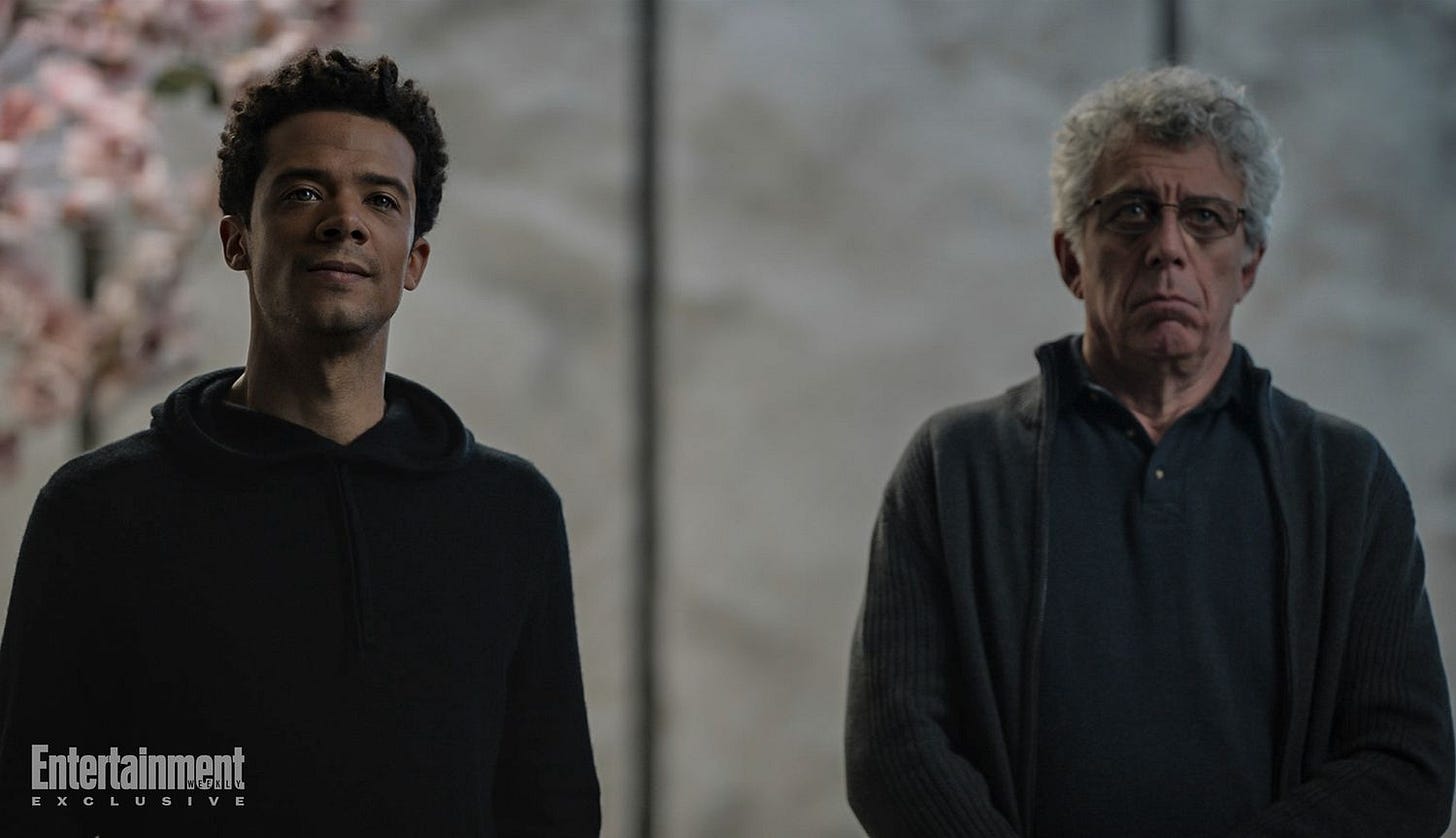
“Memory is a monster,” the show repeatedly tells us. There are so many things about the second season of IWTV that captivate me, but the manifestations of memory go above and beyond in my book. The tense piano note is my favorite, and my favorite to watch others catch on to. Lines that were previously delivered with an air of denial from Louis are suddenly drenched in alarm every time a piano key is struck. It switches from a man trying to convince himself and his biographer that he was treated with dignity and compassion to a psychological horror where he realizes that his partner has tampered with his memories of himself, his family, and his past.
This one motif goes from invoking moments of curiosity and anticipation to dread and heartbreak, none more so than when Daniel reveals that Armand directed the theatrical trial that would see Louis executed alongside his daughter Claudia (Delainey Hayles) and her companion, Madeleine (Roxanne Duran). For decades Louis believed Armand to have been a victim of the Théâtre des Vampires as he and Claudia had been — Armand spun a tale of the coven holding him hostage, threatening him with death if he aided in rescuing Louis, Claudia, and Madeleine. He presents a heroic account of using all of his strength to save Louis from execution, but insists he was unable to save Claudia.
Well, that’s not the truth, Ellen.
The truth, Daniel unveils, is that Louis was saved by Lestat, his not quite ex-husband who was a participant in the trial (reasoning for that still unclear, but Lestat’s not winning mother or spouse of the year any time soon). Armand meanwhile, directed that trial like he was Hal Prince, only taking credit for saving Louis when Louis asked him if that’s what happened. The blueprint for taking Olympic gold in Paris (for lying). What follows does make me want to put my head through a window if I’m being honest. Louis confronts Lestat about his role in their daughter’s death, and decides that since he can’t kill Lestat (he already tried and failed, though that was on purpose), he’ll give Lestat an ego death by continuing his romantic relationship with Armand.
This high school level pettiness is all fun and games and until that tense piano note strikes, and Louis is face to face with the fact that he spent 70+ years with the man who orchestrated the murder of his daughter and stripped his memories for parts in an attempt to keep him under his control all to spite Lestat. “77 years based on a seismic lie,” Daniel proclaims. Louis is a shadow of his former self. His thick New Orleans accent is gone, he’s unusually calm and docile most of the time; the things that make Louis Louis have been stripped away, and in the absence of self, he has to finally come to terms with the ways he failed Claudia.
It’s something we see throughout the series. Louis’ stories sometimes don’t line up with the pages of Claudia’s diaries, and his memory often betrays him on big moments in her life. In Season 1 we see the scene where Louis saves Claudia from a fire and as she’s dying, asks Lestat to keep her alive by turning her into a vampire. In the original telling Lestat is taunting and disinterested, Louis’ desire for a daughter laughable, but a way to keep him around. Claudia is only 14, and therefore her vampiric existence a crime. But Lestat does it, both of them cursing her forever. However, when the story is revisited during Louis and Claudia’s trial, Lestat recounts it differently. He paints a gruesome picture, Louis hysterically dragging Claudia’s nearly lifeless body like a doll across the floor as he begs Lestat to turn her. Lestat frantically insisting that Louis take into consideration that Claudia will be doomed to a life of misery. Louis saying he doesn’t care. It’s hard to watch, but as an audience, we’re not given much reason to believe Lestat in the moment — he had already altered the story of their lives in order to martyr himself in front of the “jury”.
“That’s not how it happened,” Louis calls out to the crowd and to Claudia while on trial.
“That is how it happened,” Louis admits quietly to Daniel.
Armand isn’t the only one reconstructing Louis’ memories — Louis, in an attempt to settle the guilt and grief that tears at his skin every day following Claudia’s death, is creating a narrative where he didn’t play a role in failing his daughter. It destroys me every time I think about it.
There’s another musical cue that bolsters the themes of memory throughout the season, a track on the score called “The Whole World Was Ready To Return.” It’s gorgeous; light and airy, hopeful and just melancholic enough for the moment at the end of S2 EP1. As Louis and Claudia face another setback in their search for other vampires in Europe, Louis promises Claudia that they’ll keep going, no matter what. “If you were the last vampire on Earth, it would be enough,” he tells her as the score swells. It’s a beautiful moment between them, and it’s said with such resolve that you believe it — until the camera slides over and you see, next to Claudia, a vision of Lestat, fresh after “dying” at Louis and Claudia’s hands. The tempo of the music grows quicker while Louis repeats the words tenaciously. “You and me, me and you, you and me.” It’s a sinking feeling when you can’t decipher if he’s saying the words to the daughter who needs him or the memory of his butchered companion, Louis drowning in the perceived curse of vampirism once again.
Memory is such a tangible thing for Louis, and something that for the longest time tethers him to humanity. While in Paris he takes up photography. Drawn to portraiture, he takes photos of lovers on the street, of Claudia euphoric on the back of a motorcycle, Armand in the early days of their affair (a photo that was only taken as a way to see if Louis’ hallucination of Lestat was real). To me, photography is the ultimate memory catcher, and a way for Louis to grip onto the life he feels himself slipping away from as time progresses.
It’s not just photography, though. Louis has reminders of his loved ones scattered across the Dubai penthouse. Claudia’s diaries, a portrait of his deceased brother, Paul, the dress Claudia was wearing when she died. Even Daniel, to a point, is a tangible memory. “I need this boy to survive the night,” he tells Armand in San Francisco. It echoes Louis' sentiment when he begs Lestat to turn Claudia: “I just need her not to die.” In New Orleans, it was Claudia leading Louis to moments of realization in his relationship with Lestat. In Dubai, it’s Daniel. “A vivid writer, isn’t she?” Louis asks Daniel as he reads her diaries. “A singular style.” I wonder if Louis ever saw Claudia in the young writer he tried to tell his story to — the “bright young reporter with a point of view.” Daniel gives Louis his memories back, shoves Louis into a sense of self again, and like Claudia, will now be forever linked to Louis, Lestat, and Armand because of it.
The thread that winds between memory, storytelling, and connection is a thin (but strong) one. Rarely can you have one without the others. And when Louis feels himself returning, he goes to the one person he could have turned to when it came to remembering and grieving Claudia — Lestat. Lestat in New Orleans, Lestat right where Louis remembers him best. It’s the first time we see Lestat in a real light, not a memory of Louis or Armand, not an entry in Claudia’s journal. And he’s weird. Less the domineering predator that we’ve come to except, more twitchy and an emotional wreck. It feels like Lestat, but it really puts into perspective how Louis viewed him, how Armand viewed him, and perhaps how Armand skewed him in Louis' memories.
The Louis and Lestat reunion is awful (very good). They clear the air on Paris, on Louis’ attempted suicide in San Francisco, and on where Louis now stands with Armand. Finally, they make their way to the reason they’re both here — Claudia. For the first time, we see Louis grieve. The reunion is less about two lovers rekindling their relationship, and more about two parents coming together to remember their daughter. It’s devastating, partly because of the amount of time that has passed since her death. They’re both haunted by the inadequate ways they protected her, but they’re finally connected in their shared grief and memories. It reminds me of a scene from The Odyssey, where Odysseus and his wife Penelope reunite after 20 years. The gods slow time so that the couple can spend all night telling stories — what they went through, the people they lost, trying to make up for decades of lost time and relying solely on their memories to bring themselves up to equal playing fields in one another’s lives.
The scene also gives way to one final music cue. Louis, finally able to see his vampiric life as a gift, returns to the Dubai penthouse alone. His accent has returned. He’s wearing color again. He sits down — Claudia’s dress hanging on the wall on one side of him, his brother’s portrait on the other — and telepathically challenges every vampire in the world to come jump him. Listen, one conversation can’t fix everything, maybe physically fighting every living vampire is part of his healing journey and I support him!!!
“I own the night,” he swaggers, fully embracing who he is for the first time. And in this acceptance, the one thing that both Lestat and Claudia wanted for him, the score from Episode 1 returns. The strings twinkle in the most heavenly, bittersweet, way, and instead of the pit in my stomach that I feel when I hear the song as Louis battles between his obligation towards Claudia and his guilt regarding Lestat, I feel the weight of love that comes with memory. The good, the bad, the inbetween, it all is radiating off of Louis. “I am made of memories,” as Madeline Miller once wrote.
This was a very long-winded way of saying I’m obsessed with the creepy piano motif in Season 2 of Interview with the Vampire. Our memories are one of the most special parts of our lives. The first teaser for the third season of the show was released this past weekend, and from what I know about the story thus far, things are about to fly off the rails in the memory department (long live manic, rockstar Lestat who is apparently getting canceled by Swifites right now). So get an AMC+ subscription, watch the first season on Netflix starting August 19th, or find some secret third way to watch the best show on television before it gets even better.
And if you made it this far, thank you for reading! This is my first dip back into writing in a while, and it feels good to flex that muscle again.
More to come soon :)

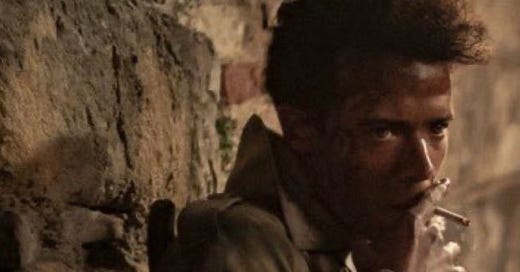


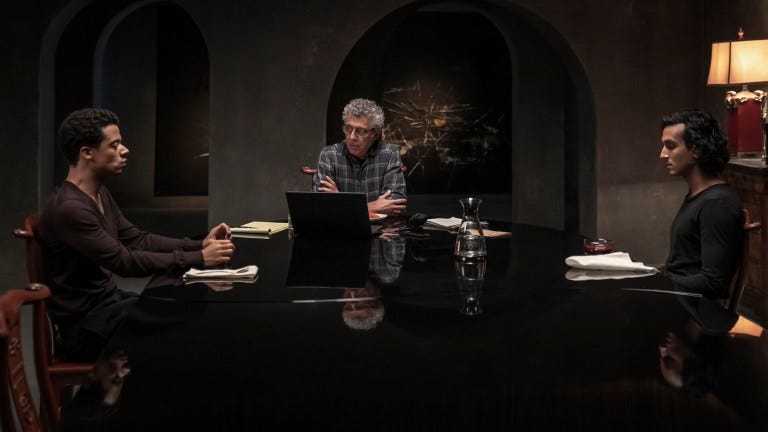


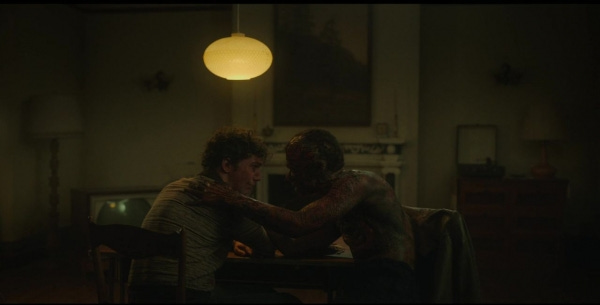
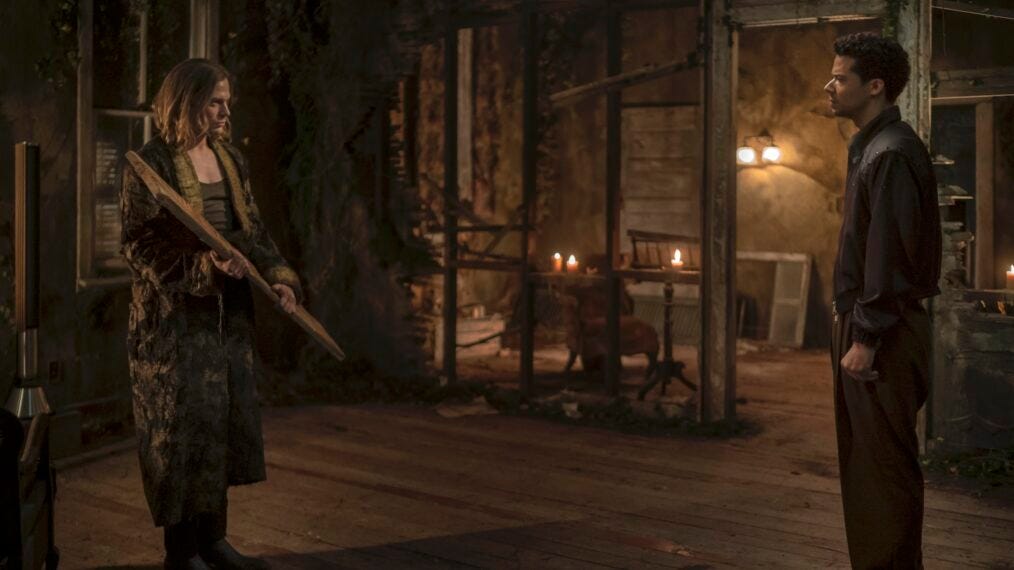

I just decided to rewatch IWTV because my friends and I were talking about it! I didn’t notice the music changes you pointed out my first watch, so I’m definitely going to pay attention and listen for them!
amei o seu olhar! não tinha prestado tanta atenção à música, mas agora que você deu tanto foco a esse pequeno detalhe que cria toda a atmosfera da série, estou encantada! sinto que há muito cuidado e amor dedicado à produção de entrevista com o vampiro. e talvez você não entenda nada que estou escrevendo, mas é só para agradecer pela partilha!